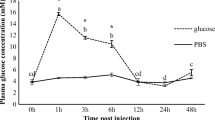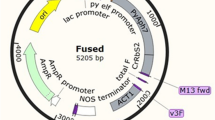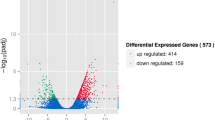Abstract
Peroxisome proliferator–activated receptor β (pparβ) is a key gene–regulating lipid metabolism pathway, but its function in turbot remains unclear. In this study, the CDS of pparβ was cloned from kidney for the first time. The CDS sequence length was 1533 bp encoding 510 amino acids. Structural analysis showed that the pparβ protein contained a C4 zinc finger and HOLI domain, suggesting that the pparβ gene of turbot has high homology with the PPAR gene of other species. The high expression patterns of pparβ, acox, and cpt-1 at high temperatures, as shown through qPCR, indicated that high temperatures activated the transcriptional activity of pparβ and increased the activity of the acox and cpt-1 genes. The expression of acox and cpt-1 was significantly inhibited when pparβ was downregulated using RNAi technology and inhibitor treatments, suggesting that pparβ positively regulated acox and cpt-1 expression at high temperatures and, thus, modulates lipid catabolism activity. These results demonstrate that pparβ is involved in the regulation of lipid metabolism at high temperatures and expand a new perspective for studying the regulation of lipid metabolism in stress environments of teleost.







Similar content being viewed by others
Data availability
All data generated and analyzed during this study are included in this published article and its supplementary information files. The gene sequence has been submitted to NCBI, GenBank accession number MT275452.
References
An W, Dong X, Tan B et al (2021) Dietary n-3 long chain polyunsaturated fatty acids affect the serum biochemical parameters, lipid-metabolism-related of gene expression and intestinal health of juvenile hybrid grouper (♀ Epinephelus fuscoguttatus×♂ Epinephelus lanceolatu). Aquac Nutr 27(5):1383–1395. https://doi.org/10.1111/anu.13276
Bedu E, Wahli W, Desvergne B (2005) Peroxisome proliferator-activated receptor β/δ as a therapeutic target for metabolic diseases. Expert Opin Ther Targets 9(4):861–873. https://doi.org/10.1517/14728222.9.4.861
Berger J, Moller DE (2002) The mechanisms of action of PPARs. Annu Rev Med 53:409–435. https://doi.org/10.1146/annurev.med.53.082901.104018
Bionaz M, Loor JJ (2008) Gene networks driving bovine milk fat synthesis during the lactation cycle. BMC Genomics 9:366. https://doi.org/10.1186/1471-2164-9-366
Chang MX, Nie P (2008) RNAi suppression of zebrafish peptidoglycan recognition protein 6 (zfPGRP6) mediated differentially expressed genes involved in Toll-like receptor signaling pathway and caused increased susceptibility to Flavobacterium columnare. Vet Immunol Immunopathol 124(3–4):295–301. https://doi.org/10.1016/j.vetimm.2008.04.003
Chen QL, Luo Z, Liu CX et al (2015) Effects of waterborne copper exposure on carnitine composition, kinetics of carnitine palmitoyltransferases I (CPT I) and mRNA levels of CPT I isoforms in yellow catfish Pelteobagrus fulvidraco. Chemosphere 2015(139):349–357. https://doi.org/10.1016/j.chemosphere.2015.06.075
Cheng L, Ding G, Qin Q et al (2004) Cardiomyocyte-restricted peroxisome proliferator-activated receptor-δ deletion perturbs myocardial fatty acid oxidation and leads to cardiomyopathy. Nat Med 10:1245–1250. https://doi.org/10.1038/nm1116
Dressel U, Allen TL, Pippal JB et al (2003) The peroxisome proliferator-activated receptor beta/delta agonist, GW501516, regulates the expression of genes involved in lipid catabolism and energy uncoupling in skeletal muscle cells. Mol Endocrinol 17(12):2477–2493. https://doi.org/10.1210/me.2003-0151
Dreyer C, Krey G, Keller H, Givel F, Helftenbein G, Wahli W (1992) Control of the peroxisomal beta-oxidation pathway by a novel family of nuclear hormone receptors. Cell 68(5):879–887. https://doi.org/10.1016/0092-8674(92)90031-7
Escher P, Wahli W (2000) Peroxisome proliferator-activated receptors: insight into multiple cellular functions. Mutat Res 448(2):121–138. https://doi.org/10.1016/S0027-5107(99)00231-6
Ez-Zoubir A, Frédéric B, Gérard A et al (1995) Cloning of a protein that mediates transcriptional effects of fatty acids in preadipocytes. J Biol Chem 270(5):2367–2371. https://doi.org/10.1074/jbc.270.5.2367
Gao CR, Wang YG, Ma AJ et al (2006) Effects of temperature on growth, survival rate and protease activity of juvenile Turbot. Marine Fisheries Res 2006(06):33–36 (in Chinese)
Hanington PC, Hitchen SJ, Be Amish LA et al (2009) Macrophage colony stimulating factor (CSF-1) is a central growth factor of goldfish macrophages. Fish Shellfish Immunol 26(1):1–9. https://doi.org/10.1016/j.fsi.2008.09.020
Holst D, Luquet S, Nogueira V et al (2003) Nutritional regulation and role of peroxisome proliferator-activated receptor delta in fatty acid catabolism in skeletal muscle. Biochim et Biophys Acta 1633(1):43–50. https://doi.org/10.1016/S1388-1981(03)00071-4
Jia Y, Chen X, Wang Z et al (2020) Physiological response of juvenile turbot (Scophthalmus maximus. L) during hyperthermal stress. Aquaculture 529(15):735645. https://doi.org/10.1016/j.aquaculture.2020.735645
Kong F, Romero IT, Warakanont J et al (2018) Lipid catabolism in microalgae. New Phytol 218(4):1340–1348. https://doi.org/10.1111/nph.15047
Kota BP, Huang TH, Roufogalis BD (2005) An overview on biological mechanisms of PPARs. Pharmacol Res 51(2):85–94. https://doi.org/10.1016/j.phrs.2004.07.012
Lefebvre P (2006) Sorting out the roles of PPARα in energy metabolism and vascular homeostasis. J Clin Investig 116(3):571–580. https://doi.org/10.1172/JCI27989
Liu J, Wang P, Luo J et al (2011) Peroxisome proliferator-activated receptor β/δ activation in adult hearts facilitates mitochondrial function and cardiac performance under pressure-overload condition. Hypertension 57:223–230. https://doi.org/10.1161/HYPERTENSIONAHA.110.164590
Liu M, Wang L, Cheng Y et al (2019) Effect of estradiol on hepatopancreatic lipid metabolism in the swimming crab, Portunus trituberculatus. Gen Comp Endocrinol 280:115–122. https://doi.org/10.1016/j.ygcen.2019.04.019
Lu Y, Wu Z, Song Z, Xiao P, Liu Y, Zhang P, You F (2016) Insight into the heat resistance of fish via blood: effects of heat stress on metabolism, oxidative stress and antioxidant response of olive flounder Paralichthys olivaceus and turbot Scophthalmus maximus. Fish Shellfish Immunol 2016:125–135. https://doi.org/10.1016/j.fsi.2016.09.008
Ma AJ, Wang XA (2015) Development of Scophthalmus maximus seed industry and application of relevant cutting-edge technologies. Oceanol Limnol 46(06):1461–1466 (in Chinese)
Moraes LA, Piqueras L, Bishop-Bailey D (2006) Peroxisome proliferator-activated receptors and inflammation. Pharmacol Ther 110(3):371–385. https://doi.org/10.1016/j.pharmthera.2005.08.007
Palomer X, Barroso E, Pizarro-Delgado J et al (2018) pparβ/δ: a key therapeutic target in metabolic disorders. Int J Mol Sci 19:3. https://doi.org/10.3390/ijms19030913
Schmidt A, Endo N, Rutledge SJ, Vogel R, Shinar D, Rodan GA (1992) Identification of a new member of the steroid hormone receptor superfamily that is activated by a peroxisome proliferator and fatty acids. Mol Endocrinol 6(10):1634–1641. https://doi.org/10.1210/mend.6.10.1333051
Sher T, Yi HF, Mcbride OW et al (1993) cDNA cloning, chromosomal mapping, and functional characterization of the human peroxisome proliferator activated receptor. Biochemistry 32(21):5598. https://doi.org/10.1021/bi00072a015
Song F, Wang L, Yu Z et al (2021) Knockdown of igf3 gene by RNA interference causes gonadal development inhibition of common carp (Cyprinus carpio). Aquac Res 52:3006–3014. https://doi.org/10.1111/are.15145
Tanaka T, Yamamoto J, Iwasaki S et al (2003) Activation of peroxisome proliferator-activated receptor delta induces fatty acid beta-oxidation in skeletal muscle and attenuatesmetabolic syndrome. Proceedings of the National Academy of Sciences of the United States of America 100(26):15924–15929. https://doi.org/10.1073/pnas.0306981100
Toral M, Romero M, Jiménez R et al (2015) Carnitine palmitoyltransferase-1 up-regulation by PPAR-β/δ prevents lipid-induced endothelial dysfunction. Clin Sci (Lond) 129(9):823–837. https://doi.org/10.1042/CS20150111
Varanasi U, Chu R, Chu S et al (1994) Isolation of the human peroxisomal acyl-CoA oxidase gene: organization, promoter analysis, and chromosomal localization. Proc Nat Acad Sci 91(8):3107–3111. https://doi.org/10.1073/pnas.91.8.3107
Vázquez-Carrera M (2016) Unraveling the effects of PPARβ/δ on insulin resistance and cardiovascular disease. Trends Endocrinol Metab 27(5):319–334. https://doi.org/10.1016/j.tem.2016.02.008
Wang YX, Lee CH, Tiep S, et al (2003) Peroxisome-proliferator-activated receptor delta activates fat metabolism to prevent obesity. Cell 113(2):159–170. https://doi.org/10.1016/s0092-8674(03)00269-1
Wang J, Hou L, Li X et al (2007) Turbot beta-actin gene preliminary study. J Fish (4):214–217. https://doi.org/10.16378/j.cnki.1003-1111.2007.04.008
Wang N, Wang XL, Sha ZX et al (2010) Development and characterization of a new marine fish cell line from turbot (Scophthalmus maximus). Fish Physiol Biochem 36:1227–1234. https://doi.org/10.1007/s10695-010-9402-y
Wang AM, Yang WP, Liu F et al (2017) Peroxisome proliferator-activated receptor alpha (PPARα) in redlip mullet, Liza haematocheila: molecular cloning, Mrna tissue expression, and response to dietary lipid levels. Turkish Journal of Fisheries and Aquatic Sciences 17(3):689–699. https://doi.org/10.4194/1303-2712-v17_3_04
Wang XY, Liu QH, Xiao YS et al (2017) High temperature causes masculinization of genetically female olive flounder (Paralichthys olivaceus) accompanied by primordial germ cell proliferation detention. Aquaculture 479. https://doi.org/10.1016/j.aquaculture.2017.07.019
Xie P, Yuan C, Wang C et al (2014) Molecular cloning and tissue distribution of peroxisome proliferator-activated receptor-alpha (PPARα) and gamma (PPARγ) in the pigeon (Columba livia domestica). British Poultry Sci 55(2):136–142. https://doi.org/10.1080/00071668.2014.889281
Yang S, Zhao T, Ma A et al (2020) Metabolic responses in Scophthalmus maximus kidney subjected to thermal stress. Fish and Shellfish Immunology 103. https://doi.org/10.1016/j.fsi.2020.04.003
Yu YH, Wang PH, Cheng WT et al (2010) Porcine peroxisome proliferator-activated receptor delta mediates the lipolytic effects of dietary fish oil to reduce body fat deposition. J Anim Sci 88(6):2009–2018. https://doi.org/10.2527/jas.2009-2597
Yue X, Huan P, Hu Y et al (2018) Integrated transcriptomic and proteomic analyses reveal potential mechanisms linking thermal stress and depressed disease resistance in the turbot Scophthalmus maximus. Sci Rep 8:1896. https://doi.org/10.1038/s41598-018-20065-1
Zhao TT, Ma AJ, Huang ZH et al (2021) Transcriptome analysis reveals that high temperatures alter modes of lipid metabolism in juvenile turbot (Scophthalmus maximus) liver. Comparative Biochemistry and Physiology Part D: Genomics and Proteomics 2021. https://doi.org/10.1016/j.cbd.2021.100887
Zhao T, Ma A, Yang S et al (2021) Integrated metabolome and transcriptome analyses revealing the effects of thermal stress on lipid metabolism in juvenile turbot Scophthalmus maximus. J Therm Biol 99. https://doi.org/10.1016/j.jtherbio.2021.102937
Acknowledgements
We thank International Science Editing (http://www.internationalscienceediting.com) for editing this manuscript.
Author information
Authors and Affiliations
Contributions
Tingting Zhao: conceptualization, methodology, writing—original draft. Aijun Ma: conceptualization, methodology. Zhihui Huang: methodology. Zhifeng Liu: writing—review and editing. Zhibin Sun: software. Liguang Zhu and Haowen Chang: resources.
Corresponding author
Ethics declarations
Ethics approval
All the experimental animal programs involved in this study were approved by the Yellow Sea Fisheries Research Institute’s animal care and use committee (ID Number: YSFRI-2021026), and followed basic experimental principles.
Competing interests
The authors declare no competing interest.
Additional information
Publisher's Note
Springer Nature remains neutral with regard to jurisdictional claims in published maps and institutional affiliations.
Highlights
•A CDS sequence of pparβ was identified and characterized from turbot, Scophthalmus maximus.
•High temperature induced the expression of pparβ and activated key genes in lipid catabolism, acox and cpt-1.
•We used RNAi techniques to demonstrate that pparβ regulates lipid catabolism.
Supplementary Information
Below is the link to the electronic supplementary material.
Rights and permissions
Springer Nature or its licensor (e.g. a society or other partner) holds exclusive rights to this article under a publishing agreement with the author(s) or other rightsholder(s); author self-archiving of the accepted manuscript version of this article is solely governed by the terms of such publishing agreement and applicable law.
About this article
Cite this article
Zhao, T., Ma, A., Huang, Z. et al. pparβ regulates lipid catabolism by mediating acox and cpt-1 genes in Scophthalmus maximus under heat stress. Fish Physiol Biochem 50, 295–305 (2024). https://doi.org/10.1007/s10695-024-01313-w
Received:
Accepted:
Published:
Issue Date:
DOI: https://doi.org/10.1007/s10695-024-01313-w




